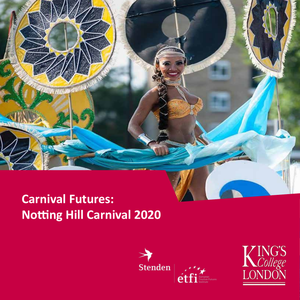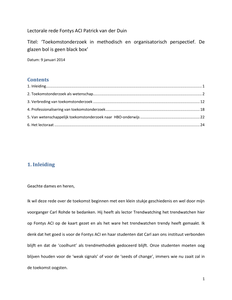De dissertatie "Probing Futures, Acting Today" van Caroline Maessen onderzoekt hoe organisaties alternatieve toekomsten kunnen verbeelden om dagelijkse toekomstvormende praktijken te veranderen teneinde complexe maatschappelijke uitdagingen aan te pakken. Organisaties hebben de neiging door lineair denken hun verbeeldingsvermogen te beperken tot conventionele toekomsten, wat effectieve reacties op problemen zoals klimaatverandering en sociale ongelijkheid belemmert. Het gevolg is dat na de zoveelste heisessie voor visieontwikkeling, er nog steeds niets fundamenteel verandert. Hoe de toekomst zich ontvouwt, tegen de achtergrond van maatschappelijke complexe problemen, gaat vaak voorbij onze collectieve verbeeldingskracht. Organisaties hebben moeite om zich te verbinden met onconventionele toekomsten en acties in het heden daarop af te stemmen. Voor betekenisvolle verandering moeten organisaties navigeren tussen de aantrekkingskracht van inspirerende onconventionele toekomsten en de behoefte aan stabiliteit en controle. Maessen heeft in twee (semi) publieke organisaties onderzocht waarom dit zo lastig is en hoe organisaties daarin ondersteund kunnen worden.
DOCUMENT

As the Arctic undergoes unprecedented environmental and climate transformations, an urgent call for inclusive governance and intergenerational leadership echoes across the circumpolar region. In January 2024, 29 Emerging Leaders from the Circumpolar Arctic and Subarctic gathered in Northern Norway ahead of the 2024 Arctic Frontiers Conference. This diverse group, with global identities and multi-disciplinary backgrounds spanning science, policy, business, geopolitics, and law, brought together experiences that inspired this paper. We highlight the unique perspectives offered by younger generations and leaders to advocate for changes across a spectrum of critical Arctic issues. Our voices must be present in the decision-making which shapes our future, yet we observe some politicians, diplomats, legal, and business officials engaging in protracted discourse overlooking the urgent realities faced by those most directly impacted.We address the concept of “youthwashing” and offer a critique, as well as actionable recommendations, for fostering inclusive decision-making. We explore the role of youth leadership in Arctic governance across various disciplines and how diverse perspectives are required to better shape Arctic futures. Our concerns encompass the sustainable management of the Arctic’s natural resources, respect and protection of Indigenous rights and Traditional Knowledge, and developing solutions rooted in sustainability, survivance, and justice. As Emerging Leaders, we aspire to create liveable futures for generations to come, challenging the present trajectory set by current senior leadership. In turn, we ensure that while the Arctic is undergoing significant change, it develops in a framework respectful of all generations, ultimately rooted in justice for all Arctic peoples.
LINK
Carnival Futures: Notting Hill Carnival 2020 is a King’s Cultural Institute project led by Nicole Ferdinand (Culture, Media and Creative Industries at King’s College London) which sought to engage cultural organisations and other stakeholders in planning for the future of the Notting Hill Carnival. The content of this report is intended as a contribution to current research and to identifying future directions for the development of the Notting Hill Carnival. The material and views expressed are produced by various stakeholders in a series of workshops.
DOCUMENT

In the field of climate change adaptation, the future matters. River futures influence the way adaptation projects are implemented in rivers. In this paper, we challenge the ways in which dominant paradigms and expert claims monopolise the truth concerning policies and designs of river futures, thereby sidelining and delegitimising alternative river futures. So far, limited work has been performed on the power of river futures in the context of climate change adaptation. We conceptualised the power of river futures through river imaginaries, i.e., collectively performed and publicly envisioned reproductions of riverine socionatures mobilised through truth claims of social life and order. Using the Border Meuse project as a case study, a climate change adaptation project in a stretch of the river Meuse in the south of the Netherlands, and a proclaimed success story of climate adaptation in Dutch water management, we elucidated how three river imaginaries (a modern river imaginary, a market-driven imaginary, and an eco-centric river imaginary) merged into an eco-modern river imaginary. Importantly, not only did the river futures merge, but their aligned truth regimes also merged. Thus, we argue that George Orwell’s famous quote, “who controls the past, controls the future: who controls the present, controls the past” can be extended to “who controls the future, controls how we see and act in the present, and how we rediscover the past”.
DOCUMENT
We propose aesthetic engagement as a valuable construct for organisation studies to advance its contribution to organising for sustainability. Aesthetic engagement is defined as a set of material practices that re-engage humans and systems to trigger and accelerate transitions towards regenerative futures. We adopt an aesthetic, practice-based approach to study the emerging field of circular fashion, zooming in on six research projects evolving around bio-based textile design. Our results show that matter needs to matter more in sustainable organising in three key material practices: (1) re-presenting alternative systems, (2) re-imagining affective materialities and (3) re-claiming embodied ethical agency. Matter that reflects new ‘imagined’ realities - whether in artefacts, bodies or socio-material spaces - could greatly support stakeholder engagement and collective identity-building towards transitioning to regenerative futures.
DOCUMENT

Paper submitted and accepted by World Future Review.
LINK
Introductie van het lectoraat Futures Research & Trendwatching.
DOCUMENT

The Caribbean Netherlands are dealing with a situation where imported vegetables and fruits are mostly imported and hardly affordable. This leads to consuming unhealthy food and high obesities rates as a consequence. A lack of good agricultural practices with regard to water-smart and nature inclusive agriculture, as well as limited coping capacities to deal with hazards and climate change, results in very limited local production and interest. Initiatives that focused only on agrotechnological solutions for food resilient futures turned out to be ineffective due to a lack of local ownership, which jeopardizes sustainability. Moreover, the 'green' and 'blue' domains are not seen as attractive career perspectives among youth, hampering a bright future for those domains.
DOCUMENT
